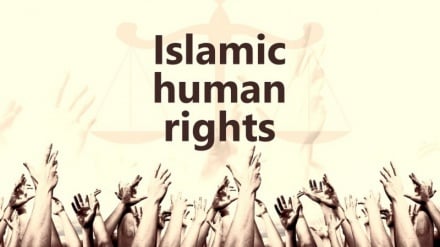Islamic Human Rights (18)
In this episode, we speak of the difference in the viewpoints of Western and Islamic human rights toward the topic of suicide.
In the last episode, we spoke of the material and spiritual existence, and the impact of this categorization on rules and regulations. It was mentioned that the divine religion of Islam treasures the right to material and spiritual existence and no one can deny this right from oneself and/or any other human being. Also, it was stated that Western human rights have been set by human beings who are held captive by their own bodies. Hence, Western human rights rules and regulations cannot be considered as worldwide rules. However, religion, which has been determined by God and doesn’t comply with any kind of materialism is naturally universal and is not limited to any particular time and location. The sacred religion of Islam, in addition to valuing mankind’s material life, treasures the spiritual existence of human beings. Thus, divine teachings and rules and regulations match both the material and spiritual existence of human beings.
Islam pays especial attention to the material and physical existence of man. Commitment of suicide has been resolutely rejected by this divine religion. None of the other schools of thought put emphasis on the prohibition of suicide as much as the divine religion of Islam.
29th and 30th ayahs of Surat al-Nisa in Holy Quran note: “O you who have faith! … Do not kill yourself. Indeed Allah is most merciful to you. And whoever does that in aggression and injustice, We will soon make him enter the Fire, and that is easy for Allah.”
The right of existence is highly valued such that if an individual, with a long religious background, would violate this right and would intend to commit suicide, he will ultimately go to hell and will face divine punishment. In the history of Islam, it has been said that once Prophet Mohammad referred to an individual and noted that that person would ultimately go to hell. Some were surprised to hear the Prophet’s remarks, because the person mentioned by the Prophet carried out good deeds and attended the scenes of struggle and politics. Then, they saw that person getting injured in a battle front, committing suicide to end the pain he suffered from his injuries.
In the view of some other schools of thought, man is free to make use of his right to existence anyway he wants. For instance, euthanasia has been legalized in some countries in recent years. The word Euthanasia is comprised of the Greek term “eu” which means good and comfortable, and the Latin term “thanatou” that means death. So, word by word, euthanasia can be defined as comfortable death.
In euthanasia, a patient who suffers from a fatal illness personally requests an end to his/her life. At times, the patient’s death is achieved by injection of a fatal dose of medications.
But the question that crops up is whether human beings have the right to take away their own lives either via commitment of suicide and/or termination of their lives in case of endurance of a painful terminal illness?
According to divine ideology, the entire universe and whatever has been created in it, belongs to God Almighty. Hence, divine assets can only be seized with the permission of God. This fact is perfectly clear in regard to divine creatures, and whatever God has set as religiously allowed or forbidden. One of the creatures of God is human beings and their lives. Mankind is not permitted to take away his life without divine content. Commitment of suicide resembles the murder of a human being with no reason.
Moreover, commitment of suicide goes against the philosophy behind creation of mankind, and is therefore forbidden in Islam. God Almighty created mankind to live in the world and to reach perfection and eternal divine blessings via compliance with divine instructions, and guidelines of divine prophets. The material world is a means for attainment of prosperity. A person who commits suicide wipes out the grounds for a worldly life and fights against divine prudence and wisdom. This is because God created him to live and to die due to natural causes. A person who commits suicide has acted against the divine will.
In the view of Islamic ideology and based on Quranic teachings, God owns the entire universe and has bestowed countless blessings on mankind so that man would attain perfection and prosperity. So, wastage and eradication of these divine blessings is against God’s will.
In the divine religion of Islam, human life and existence is sacred, and man has been prohibited from taking his life. Individuals cannot deal with their existence anyway they want. So, no one can say that he wants to commit suicide or say that he accepts humiliation, because existence is directly related to divine providence, and mankind should safeguard his life and his honor as much as he is able to do so.
Moreover, the prohibition of commitment of suicide in Islam doesn’t solely intend to safeguard the life of the individual who wants to commit suicide. In fact, Islam via this ruling has intended to protect the existence of the entire human community.
Any human being has certainly experienced disappointments and/or failures which may dash one’s hopes and sadden the individual. In this situation, there are two kinds of people. Some honorably put behind woes and difficulties and begin to rebuild their lives despite all adversities, by reliance upon God. In contrast, there are those who fail to endure hardships and are isolated and/or even commit suicide. If man would be familiar with the logic of divine religion of Islam, he realizes that he cannot commit suicide, because in Islam, death doesn’t mark the end of the path, and in fact marks the beginning of a never-ending path.
Moreover, no problem in the world is important enough to push man toward taking away his own treasured live. Human wisdom tells us that eradication of a divine blessing is a misdeed. This fact is perfectly clear to mankind in any age and/or faith.
If one believes in God and realizes that God has created the universe and man with a purpose, he will never face despair. If one has faith in God’s omnipotence, he will rely on God amid adversities, realizing that he can put behind his problems with the assistance of God Almighty and by remembrance of God, which grants peace of mind to mankind.
MR/MG


